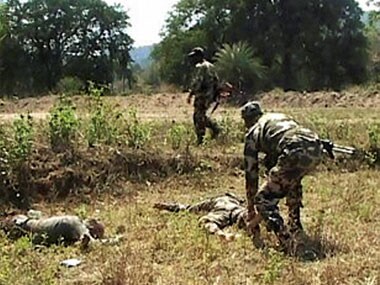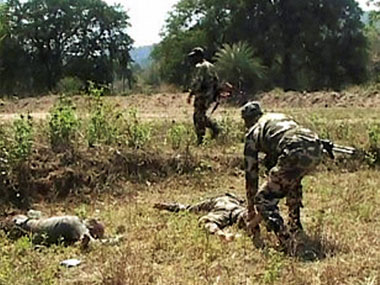Raigarh: The alleged abduction of 300 villagers by Maoists in Sukma before the visit of Prime Minister Narendra Modi could mark the beginning of another phase of intense confrontation between the state and the Left ultras in the Bastar region of Chhattisgarh. The government appears to have sent out the impression to the Maoists that it would renew Salwa Judum without making it official and the latter seem to be responding to that through the ‘kidnapping’. Five days prior to this incident, a press conference in Bastar left little doubt on the re-launch of the decidedly controversial ‘Salwa Judum’ movement targeting the Maoists in the area. It was addressed by the associates of late Mahendra Karma, a Congress leader who was killed along with many of his party colleagues in a Maoist attack two years ago. The leadership of this to-be-revived movement, the media was informed, would be in the hands of Chhavindra, the lesser known son of Karma, and Sukhdeo Tati, an old RSS hand in the area and others. [caption id=“attachment_2236304” align=“alignleft” width=“380”]
 Representational image. PTI[/caption] Salwa Judum, loosely translated as ‘Peace March’, was launched as a movement against the Naxal presence in the area. The militia consisting of the tribal youth and children, armed, financed, trained and supported by the government soon became controversial. The use of the poorly trained tribals by the government for its counter insurgency drives and the resultant human rights violations and atrocities were heavily criticised and opposed generally. Acting on a public interest litigation moved by Prof Nandini Sundar and others, the Supreme Court declared the militia illegal and unconstitutional and ordered its disbanding in 2011. If the state government has realised that the time for it to take visibly decisive action against the Maoists, the reasons are understandable. It is under immense pressure to be seen to be doing so. What is perplexing however is the complete silence of the government over the public announcement to revive the Salwa Judum movement. “It is contempt of the Supreme Court,” says Alok Shukla of the Chhattisgarh Bachao Andolan. “Thousands of tribals were killed at the hands of the fellow tribals at the behest of the government of the day simply because it wanted to clear the land for the industrialists to come and occupy it. How an announcement of the revival of a movement like this can be made on the eve of the Prime Minister’s visit without the implicit consent of the government?” wonders Shukla. When looked in the backdrop Modi’s visit, the announcement of Salwa Judum doesn’t appear too out of place though. Shankar Sodhi, a senior tribal leader from Bastar and a minister in the first Congress government in the state explains, “This is nothing but an attempt by the state government to assure the industry of its determination to clear the area for them. It has done this earlier and failed. The visit of the prime minister would have had some meaning if it had to be associated with the inauguration of a project. Today he has just signed an MoU. Already thousands of MoUs worth thousands of zeros are gathering dust in Raipur. This would become one such MoU if the core issue of land is not tackled first.” Land is the core issue indeed. Industrial houses like the Tatas and Essars that have been handed over land in the area years ago, mostly in 2005, have not been able to take possession of it and start operations due to the Maoists’ threat looming large. With the Congress under a resurgent Rahul Gandhi bringing the provisions of the Land Acquisition Act into focus, the going is not likely to be smooth for industrial houses. The Congress has started hammering one particular provision which says if the industrial house does not begin operations in five years, the allotment should be cancelled and land returned to the original owners. The state Congress is in the final stages of planning a visit by Rahul Gandhi to Chhattisgarh in the near future, and invocation of this provision, in all likelihood, is going to be the mainstay of his campaign here. “The UPA had safeguarded the interests of the landowners in the Act which the present government is trying to circumvent through ordinances. We will now allow it to happen,” says Anil Agarwal, secretary of the Chhattisgarh State Congress party. The Maoists have not taken the threat to their dominance lightly. This they demonstrated by managing to carve out a rather thick slice out of the news space by taking 300 villagers hostage in a village not very far from the venue of the Prime Minister’s programme. The Maoists had plastered walls and trees with posters asking people to boycott PM’s functions at Dantewada on Saturday. The BJP under Raman Singh first came to power in 2003. Its first tactical approach to handle the Maoist problem was to join hands with people like Congress leader Mahendra Karma in Bastar. Karma was the leader of the opposition in the assembly then. Karma was the first public figure to publicly defy Maoists presence in Bastar. In 1991, he had started a movement called ‘Jan Jaagran Abhiyan’ to counter the Maoists who were in the early stages of strengthening their hold in the area then. It fizzled out by 1996, mainly due to the lack of an organisational support. Karma who started his political career as a CPI MLA, was elected to the Lok Sabha from Bastar as an independent in 1996. He had joined Madhav Rao Scindia’s three-member team under the banner of Madhya Pradesh Vikas Congress in the post-hawala days. Karma joined the Congress thereafter and tried to revive the movement in the next two years without much success. Raman Singh understandably extended his hand to Karma. A series of meetings resulted in 2005 what came to be known, rather infamously, as ‘Salwa Judum’. Gudsa Usendi, the Maoist leader, through a press release on Friday had warned people against getting involved with the Salwa Judum - 2. There is a serious possibility that the villagers, who were rounded up by the Maoists and held hostage, were those ‘requisitioned’ by the organisers of the public meeting by the PM to attend and swell it.
Representational image. PTI[/caption] Salwa Judum, loosely translated as ‘Peace March’, was launched as a movement against the Naxal presence in the area. The militia consisting of the tribal youth and children, armed, financed, trained and supported by the government soon became controversial. The use of the poorly trained tribals by the government for its counter insurgency drives and the resultant human rights violations and atrocities were heavily criticised and opposed generally. Acting on a public interest litigation moved by Prof Nandini Sundar and others, the Supreme Court declared the militia illegal and unconstitutional and ordered its disbanding in 2011. If the state government has realised that the time for it to take visibly decisive action against the Maoists, the reasons are understandable. It is under immense pressure to be seen to be doing so. What is perplexing however is the complete silence of the government over the public announcement to revive the Salwa Judum movement. “It is contempt of the Supreme Court,” says Alok Shukla of the Chhattisgarh Bachao Andolan. “Thousands of tribals were killed at the hands of the fellow tribals at the behest of the government of the day simply because it wanted to clear the land for the industrialists to come and occupy it. How an announcement of the revival of a movement like this can be made on the eve of the Prime Minister’s visit without the implicit consent of the government?” wonders Shukla. When looked in the backdrop Modi’s visit, the announcement of Salwa Judum doesn’t appear too out of place though. Shankar Sodhi, a senior tribal leader from Bastar and a minister in the first Congress government in the state explains, “This is nothing but an attempt by the state government to assure the industry of its determination to clear the area for them. It has done this earlier and failed. The visit of the prime minister would have had some meaning if it had to be associated with the inauguration of a project. Today he has just signed an MoU. Already thousands of MoUs worth thousands of zeros are gathering dust in Raipur. This would become one such MoU if the core issue of land is not tackled first.” Land is the core issue indeed. Industrial houses like the Tatas and Essars that have been handed over land in the area years ago, mostly in 2005, have not been able to take possession of it and start operations due to the Maoists’ threat looming large. With the Congress under a resurgent Rahul Gandhi bringing the provisions of the Land Acquisition Act into focus, the going is not likely to be smooth for industrial houses. The Congress has started hammering one particular provision which says if the industrial house does not begin operations in five years, the allotment should be cancelled and land returned to the original owners. The state Congress is in the final stages of planning a visit by Rahul Gandhi to Chhattisgarh in the near future, and invocation of this provision, in all likelihood, is going to be the mainstay of his campaign here. “The UPA had safeguarded the interests of the landowners in the Act which the present government is trying to circumvent through ordinances. We will now allow it to happen,” says Anil Agarwal, secretary of the Chhattisgarh State Congress party. The Maoists have not taken the threat to their dominance lightly. This they demonstrated by managing to carve out a rather thick slice out of the news space by taking 300 villagers hostage in a village not very far from the venue of the Prime Minister’s programme. The Maoists had plastered walls and trees with posters asking people to boycott PM’s functions at Dantewada on Saturday. The BJP under Raman Singh first came to power in 2003. Its first tactical approach to handle the Maoist problem was to join hands with people like Congress leader Mahendra Karma in Bastar. Karma was the leader of the opposition in the assembly then. Karma was the first public figure to publicly defy Maoists presence in Bastar. In 1991, he had started a movement called ‘Jan Jaagran Abhiyan’ to counter the Maoists who were in the early stages of strengthening their hold in the area then. It fizzled out by 1996, mainly due to the lack of an organisational support. Karma who started his political career as a CPI MLA, was elected to the Lok Sabha from Bastar as an independent in 1996. He had joined Madhav Rao Scindia’s three-member team under the banner of Madhya Pradesh Vikas Congress in the post-hawala days. Karma joined the Congress thereafter and tried to revive the movement in the next two years without much success. Raman Singh understandably extended his hand to Karma. A series of meetings resulted in 2005 what came to be known, rather infamously, as ‘Salwa Judum’. Gudsa Usendi, the Maoist leader, through a press release on Friday had warned people against getting involved with the Salwa Judum - 2. There is a serious possibility that the villagers, who were rounded up by the Maoists and held hostage, were those ‘requisitioned’ by the organisers of the public meeting by the PM to attend and swell it.
Abduction of 300 villagers: Revival of Salwa Judum could trigger new Maoist-state war in Chhattisgarh
Parivesh Mishra
• May 10, 2015, 11:09:51 IST
The alleged abduction of 300 villagers by Maoists in Sukma before the visit of Prime Minister Narendra Modi could mark the beginning of another phase of intense confrontation between the state and the Left ultras in the Bastar region of Chhattisgarh.
Advertisement
)
End of Article